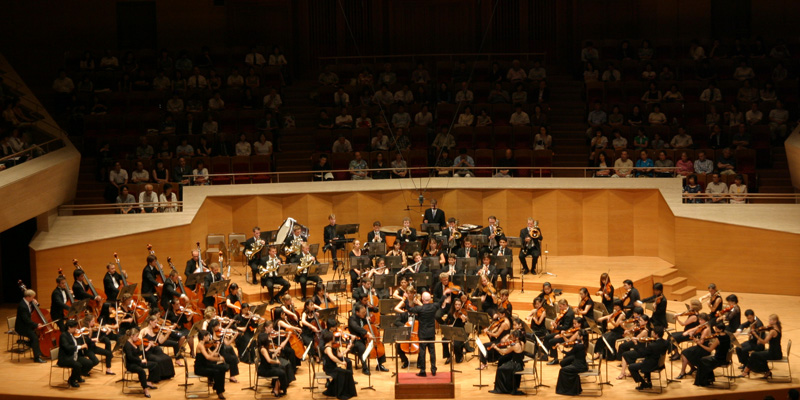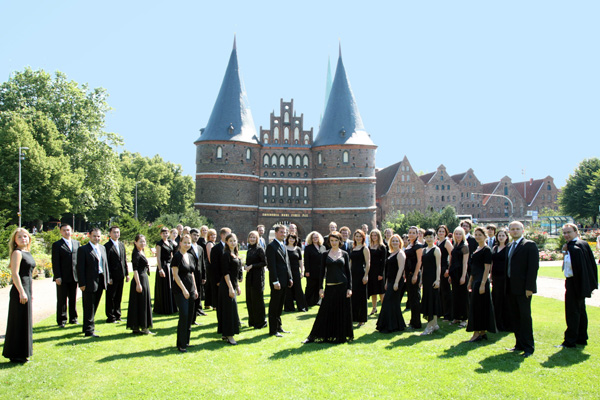Libretto by Newburgh Hamilton after the poem by John Dryden
Yana Mamonova (soprano)
Lucia Duchonova (mezzo)
Benjamin Bruns (tenor)
Wiard Witholt (bass)
All who have purchased tickets to the concert are free to visit the exhibition dedicated to outstanding German conductor Wilhelm Furtwängler. Photographs, correspondence, audio recordings and souvenirs provided by the Archives of the Berlin Philharmonic Orchestra present an insight into the live, art and musical legacy of Furtwängler within the context of his time.
 |
The Schleswig-Holstein Festival Orchestra The Schleswig Holstein Orchestral Academy came into being in 1987 on the initiative of the great American conductor Leonard Bernstein, who became its first Artistic Director. A training centre for young orchestra musicians on the very highest level, it was based on the model of the American Tanglewood Festival. It forms the centerpiece of the educational work performed by one of Europe´s most important classical music festivals, held in the north of Germany. |
 |
The Schleswig-Holstein Festival Chorus Academy was established in 2000 by Rolf Beck, who was appointed its Director. Ever since, singers from throughout Europe have come to the Schleswig-Holstein Festival every year to present the wider public with new programmes prepared by the Academy. Together with the Orchestral Academy founded by Leonard Bernstein at Salzau Castle and at international master classes at the Musikhochschule in Lübeck, the Schleswig-Holstein Festival Chorus Academy aims to make a new mark on music education today. Under renowned conductors and together with famed orchestras, students of the Academy work not just on choral pieces from the classical repertoire, music a cappella, but also on music by contemporary composers. |
| Sponsored by |  |
The oratorio Alexander's Feast, or The Power of Music, HWV 75, is one of the most common repertoire works of George Frederick Handel. The composer and his librettist Newburgh Hamilton were inspired by the famous poem in honour of the patron saint, St Cecilia, written by John Dryden in 1697, and already set to music by Englishmen Jeremiah Clarke and Thomas Clayton, as well as by the Italian Benedetto Marcello.
The text of the poem speaks of Alexander the Great and his beloved Thaïs of Athens´ victory over the Persians. The people and the legendary singer Timothy glorify the happy couple, comparing Alexander to Zeus himself and Thaïs to the goddess Olympia. The magical effect of Timothy´s singing is limitless: now he forces Alexander and his warriors, drunk on the gifts of Bacchus, relive the peripeteia of victorious battles, now he awakens grief and compassion for the onetime victorious but now vanquished Darius, abandoned by his friends and companions. His love for Thaïs brings a desire for reconciliation, but the living heroes – Alexander´s comrades-in-arms – are still demanding vengeance. Thaïs is known as “the other Helen” and the city of the enemies must share the sad fate of a sacked Troy... The angelic Cecilia appears, her divine art cooling earthly passions. Cecilia and Timothy´s union strengthens the triumph of eternal harmony!
Handel´s two-part composition includes and overture, recitatives, ariosos, arias and ensembles of soloists (soprano, tenor and bass), whose roles are not personified, as well as the magnificent, efficacious choruses (nine of the twenty-seven numbers of the oratorio). The premiere of the work took place to tremendous success on 19 February at London´s Covent Garden with the finest cast the composer had at his disposal: soprano Anna Strada del Pò, tenor John Beard and bass Theodor Reinhold. In Handel´s lifetime alone, the Alexander Feast was performed in Great Britain about thirty times, proving an unfailing triumph before countless audiences.
After Handel´s death, the oratorio passed beyond British shores and began a triumphal procession throughout the countries of continental Europe. Among those to judge and admire it were Herder, Ramler, Carl Philipp Emmanuel Bach, Mozart, Beethoven, Zelter and Mendelssohn. The poet Theodor Körner, who took part in a performance of the oratorio in French-occupied Vienna, dedicated a delighted poem to it, one that contained a prophecy of future emancipation, and Frédéric Chopin, who attended the Berlin performance of the Feast, called the work “the highest ideal of lofty music that is retained in the very depths of my soul”. From the 18th century, the tradition emerged of performing Handel´s masterpiece in German as well as in English, a tradition that has survived almost three centuries while retaining its significance to the present day. The Alexander Feast opens the composer´s most significant period in the oratorio genre – it was followed by Israel in Egypt, Allegro, Penseroso e Moderato, The Messiah, Samson, Judus Maccabaeus, Theodora and Jeptha.
Ivan Fedoseyev
